- Home
- Richard Matheson
Created By Page 8
Created By Read online
Page 8
“Uh-huh.” Alan pointed. “Jord … butter.”
“I mentioned Bertrand Russell to this guy in TV packaging the other day and he wanted to know if Russell worked in half hour or long form. Acidophilus has more live culture than this city. Sometimes I feel like I’ve been seduced and eroded by L.A.”
“Maybe you should start carrying tanks of oxygen.”
Jordan glanced at his Piaget. “So, he should be here any minute. He’s having some trouble with his kid, had to put her in a de-tox ranch up in Santa Barbara.”
“Oh yeah?” Alan found it interesting. Sad; odd. He wanted more detail.
“Kid’s thirteen and drilling both arms. Place costs ten a month. Hector’s ready to work. Timing’s good.”
Alan watched Jordan eating, ahi sacrificing perfect Hawaiian contours to his quick mouth. He gathered perfectly measured cauliflower to one side of the plate and poked it like a cage of POWs. He looked good tormenting things.
He’d started with ICM, right out of running a comedy club in Cancún that had been demolished in a storm, killing sixteen Mexican comics who were buried under rubble; the final 120-mile-an-hour heckle.
Within two years, by the time he was twenty-eight, he’d grafted PAC-TEL to his ear and packaged four successful sitcoms that in a better world would have been declared felonies. “Chunky Bill,” “Robot Dad,” “No Way, Jay,” and “Sayonara” strangled everything that came near without having to use both hands.
Jordan quickly did a multizero skip to CAA when Ovitz started hearing about the stealth-savant who was restless for bigger body counts; bloodier waters.
When CAA moved to their new I. M. Pei building on Wilshire, Jordan was given a chamber in the clout hive. He repped only the top directors and writer/producers. Anyone not leaving major smoke damage with their gifts was left out; Jordan was looking for asteroid momentum. By only signing a fleet of rising stars and transfer students from Andromeda, he could do little wrong.
At the age of twenty-nine, he was a legendary deal-boa, renowned for being oversexed, charming, aggressive, tasteless, and generally undeterred by conscience. Everyone knew it was only a matter of time before Jordan was the major player in the business. People were afraid of him. People had contempt for him. But everybody wanted to be on his phone sheet.
It had been his suggestion Alan meet with Hector Lee.
Alan had fallen silent and stared at Jordan incredulously when the name came up. He’d heard Hector had committed suicide with his ever-present pistol, or was a carrot in some mental institution. But he wasn’t. Jordan was still representing him.
Him and the Crips.
ugly gossip
Hector had a mixed track record. A few hits: mostly cheap action pictures. A few films that were total body bags. The look was always there. But some of the nihilistic stuff was unendurable. Dreary, Bergmanesque two-hour funerals with doomed lovers and gray moods. Voices with rainy weather in them; Auschwitz faces.
Critics had said The Deer Hunter was Paint Your Wagon compared to Hector’s third film, Sea Level, in which a self-loathing juggler/clown jumped off a building onto a schoolyard full of retarded children, crushing several, including a charming little brain-damaged imp and his kitten Booboo, a sweet calico that was all the child lived for.
It was a cheap, opaque manipulation and The New Yorker said deveining shrimp was more entertaining. Hector was demolished and disappeared from the L.A. film scene for six years, finally resurfacing in Recife, Brazil, in 1981.
There, he’d commenced a mostly unrewarding homosexual affair with a young pinhead cabana-boy named Sergio Cunha, who was both a curse and a blessing, ultimately lifting Hector’s maggoted career back into reasonable levels of opportunity.
But the personal toll was excruciating on Hector who frequently found Sergio cheating on him. And to make matters worse, in response to Hector’s jealous fits, Sergio would often throw tantrums, ripping Hector’s clothes to shreds. There were rumors Hector bought over thirty pairs of shorts the first year of the relationship.
Hector’s ideas were also lifted by Sergio at dinner parties where Sergio’s tiny brain would suckle at whatever wells of thought or viewpoint Hector had, and deftly represent them as his own. It would always infuriate Hector and when they got home, arguments would go on for hours until Sergio pulled the scissors out and cut up more bermuda shorts, driving Hector to great levels of emotional upset.
Then, just as Hector had hired a young thug to kill Sergio, as he tanned, and get him out of his thinning hair, Sergio sprinted up from the beach, where he’d been hard at work on some secret project for weeks, and showed Hector something in a binder, written in a sloppy, vacant hand.
A screenplay.
And though it lacked thought, originality, literacy, and grace, it was the lottery number Hector had been waiting for his whole life.
It was called Yesterday Isn’t Tomorrow and was the sort of dreck that tends to make a reader dizzy with stunned, wordless shock. It was the worst thing Hector had ever read, including a two-part “Bewitched” his former business manager had written on spec years back in which Samantha’s mother, Endora, implies to Darin that she would actually give him a blowjob if he’d accompany her to a warlock’s ball.
It made no sense, had no identifiable plot, wandered blindly for forty pages at a time, and drew with extravagant creative burglary from every well-known film Sergio had ever seen, which numbered under ten.
There were shreds of The Good, the Bad and the Ugly beside pathetically copied dollops of Deliverance. It was everything a script shouldn’t be and achieved its vacuous state so confidently that when Hector first read it, he’d had three Coronas and passed out.
When he came to, on the veranda overlooking the samba bay outside their apartment, he knew he could make the film. He knew exactly how to rescue it from the inertia and deadness soaking its every cell. With the right bulldozing and ruthless editing it could work.
Though Sergio had done nothing more than two or three functional circus chimps could have managed, Hector saw a comeback. Reentry. His long-forgotten body rising from the bossa nova grave, wearing a new pair of shorts.
Sergio, so rumors went, was predictably rhapsodic; the imbecilic script had forged a new identity he would go on about for hours, his perfect coffee skin shellacked in tan lotion like a person with waxy buildup. At times, he would stare up at the ceiling with a conceited grin, forever retelling the evolution of Yesterday Isn’t Tomorrow, which Hector had, by that point, begun to secretly refer to as Sergio Is Brain Dead.
But Sergio was beyond pride.
Beyond self-esteem.
His ego pigment only grew darker. To hear him tell it, which occurred almost hourly, he was Orson Welles. He was Woody Allen. He was the new voice cinema was starved for, its desperate ribs beginning to show until Sergio started writing. Though he had the intellectual depth of a parakeet, he was in love with himself anew and his superego swelled into an offensive, Boeing-like thing.
Ultimately, through Hector’s remaining connections, the film managed financing through a group of Mexican dentists, looking for a tax shelter.
It was hastily filmed in three weeks and the final product, in which Sergio starred (he’d demanded to star or the script wasn’t for sale) as an enigmatic character named Señor Samu, was decried by animal rights activists everywhere for including footage in which hundreds of sheep and chickens were burned alive, in a sequence of indulgent surrealism, when Samu burned the farm of a cartel greaser, located on the pampas.
There, amid the lanolin and feather-scented carnage, a jubilee of yelping, expiring animals, the hero, played frozenly by the former cabana-boy from Recife, wept.
His stoic, imbecile’s expression bored critics internationally but Hector began to think Sergio could be the next David Hasselhoff, minus the range. And though Sergio’s expression never changed, he looked excellent in clothes, and the two ended up making six lucrative films together in a joint venture with the Peruvian
government, who adored Sergio’s on-screen persona.
In each successive film, Sergio, as Señor Samu, seemed impossibly more mummified than the film before, his nostrils barely registering the awareness of odor, his lips faintly twitching at the sight of bodies skinned alive by his sworn enemy in every film, Eumir Puma.
As nimbly written by Sergio, Puma was a fat, sadistic, nauseating slob. He always played a merry debaser of the little people and Sergio was always cast as Senor Samu, the fearless force of justice; or as Hector saw it, basically a cadaver with a fag mustache.
Sergio wrote all the scripts, such as they were, and in one of his more profligate acts of bad thinking decided to include voice-over narration, in all the Samu films. In each picture, he droned in a nearly falsetto Portuguese about how much he hated Puma, sounding like a pissed Debby Boone.
In Sergio and Hector’s third film, The Dead Cannot Live, Sergio was particularly proud of the scene in which he was tied to the back of a Jeep and dragged over three miles of bad Lima road, in an insensitive attempt on Puma’s part to extract information. Sergio never flinched and thus his inability to act and a scene which demanded a face devoid of any expressive range, had merged into the ideal filmic lie in which he actually appeared to have some talent.
The Samu films got Hector back on his feet and when he finally got an offer from Paramount, in 1988, to direct a picture, he instantly walked out on Sergio, whom he’d come to loathe. The ex-cabana-boy and former Speedo model had been devastated and committed suicide by cutting off his hand and bleeding to death, signing a blurry GOODBYE with his wet stump on their white leather couch.
Hector, so the story went, had said Sergio’s writing was unclear to the end.
lunch two
Anyway, we’ll be lucky to get him,” said Jordan, gulping a cappuccino, throat bulbing. Le Dome was beginning to empty and he waved to exiting faces, memorizing which smiles deceived him.
“From everything I’ve heard, sounds like he’s out of his mind.” Alan gestured at the waiter to refill his iced coffee. “Can the guy still direct? I mean, have you seen any of those Samu films? Scary fuckin’ stuff, Jordan.”
“Low period. He’s still got the magic. I’ve been talking him up around the network and the buzz on this guy is palpable.”
Alan paused. When Jordan said things like “palpable,” it made him nervous.
“Hector’s gonna be bigger than ever. He paints with Dali images. And actors love him. Nicholson calls me once a week to see if they can do something.”
“Jack Nicholson?”
Jordan hadn’t even heard the joke. Alan could sense him going into his bonfire-coercion mode. The stream of ideas got faster, annoyingly ridden with incomplete references Jordan had picked up from reading too many film magazines; glittering fragments.
“But he doesn’t bring that mescaline bullshit look. It’s more Coppola. Bertolucci. Very rich, very textured. And he plays billiards with the camera. His shots always have something on their mind. His stuff makes Ken Russell look like Opie directing Splash.”
“… if this guy had directed Splash, he’d have cut off the fucking mermaid’s head and boned her on camera.” Alan was dabbing at mouth corners.
Something caught Jordan’s eye and he excused himself to visit a corner table where Meryl Streep was having soup with a twenty-one-year-old microtwat director.
As Alan watched Jordan cross the room, his mind paced in a distressed circle. He remembered reading a Vanity Fair article about Hector in which he was described as being “The Nervous Breakdown King of British Film”: a heroin addict who always wore black and spent time in and out of psychiatric facilities for years. He’d counted among his friends, the Stones, the Beatles, various Pythons, and several royals, one of whom had a cousin Hector had dated and was rumored to have had bizarre sexual parties with.
The Vanity Fair piece said, at one point, years back, Hector had made the front page of the Brit rags, getting caught in Madame Tussaud’s, after hours, where he, all his friends, and royal gal-pal had broken in and were Polaroiding themselves fucking famous wax figures.
The article went on to describe midnight boar hunts, in the nude, which Hector organized on his five-hundred-acre estate outside London. Sometimes, groupies were dressed as pigs and Hector’s many guests would hunt them down, tie them to fallen logs, and … they didn’t elaborate.
Among the stranger allegations in the piece was that Hector was a cannibal, and indeed the accompanying photos in the article showed an intense smile, complete with teeth that seemed almost sharpened. It was too fucking strange.
Further inglorious acts, the article implied, included Hector stabbing his wife, causing her death by massive infection days later. Ultimately, it was ruled involuntary manslaughter with extenuating circumstances and commonly viewed as a miscarriage of justice owing to his links to the palace. From there, Hector had directed a rumored snuff film for a royal to enjoy.
In the video, an oriental girl had been murdered after being tied up and brutally raped by a group of men wearing masks. In the finale of the maniac gem, a bottle had been broken over her soft, young forehead, then used to cut her up, inside and out. The article went to pains to say it was unconfirmed Hector had directed it. But many of the angles and camera moves bore striking resemblance to his idiosyncratic style: the entire video screamed Hector. It was allegedly titled “Broken Bottle,” and a popular underground classic. The article’s version of Hector’s filmic evolution opted to refer to earlier films as profitable “misjudgments.”
As Alan let the waiter take his plate away, a large man with a Vandyke and shoulder-length hair lumbered across the dining room, led by the maitre d’. He was dressed in black and extended a multiringed hand.
“Alan,” said the man, in a breathless Ringo growl, “my god, I’m so sorry. Hector Lee. I feel absolutely awful. Got tied up coming down from Montecito. Big car accident, terrible traffic.” He gestured embarrassment. “Were you waiting long? Please say you just got here, I don’t think my heart could take it. It’s a huge pleasure to meet you …”
He lifted a warm smile and sat, rolling his sleeves up, then down; a nervous mannerism. Alan quickly noticed a nose softened to a red ottoman by Dewar’s and battery dust. Hector dabbed his forehead with a cloth napkin and grinned; a corroded survivor. He ordered a tomato juice and looked Alan in the eye, happily. His hair was tangled and flecked with gray and he forked it from his eyes.
“My god, we’ve got so much to talk about. This pilot you’ve written is fucking brilliant! Let me just pick something here and we’ll get right to it.”
Alan watched Hector absorb the menu and sensed something decent about him. He liked the passionate eyes. The warm zeal he used for conversation. Even felt himself wanting to forgive him, for all his storming adventures and strange choices, if they were true. He wanted to believe this troubled, recovering man wasn’t responsible for a girl being murdered on camera and even agreed to share a small bowl of raspberries with Hector, who said he was a vegetarian.
By the time Jordan had returned, Alan and Hector were laughing. Hector told Alan he loved the pilot script for “The Mercenary” more than anything he’d read in ten years. His notes were well presented, thoughtful, and made Alan realize Hector understood his vision.
Hector suggested they find a strong second-unit director to do the action stuff so Hector could concentrate on the character shades and Alan agreed. Hector alluded to several small changes. They were perceptive and positive. Alan instantly agreed to them all.
“… the trick to making this pilot genuinely overwhelming, is to play it absolutely real,” said Hector with massive enthusiasm.
Alan nodded. “And it should have a kind of moral ambivalence … the audience must question their own morals about violence and sexual frankness …”
“Oh, absolutely! Absolutely!” Hector was nearly yelling. “This has to be tough. But it must explore values and social assumptions about violence. If it’s a stun
t show … or a bloodbath … it becomes dim-witted … becomes, I don’t know … sort of pornography. Same with the sexuality, don’t you think?”
“… no, that’s right. It really has to look and sound and feel dangerous. But it must comment all along … have an editorial conscience, just as the script does.”
Yes. Hector agreed. He even said he thought Alan was a brilliant talent and that didn’t hurt relations. At one point, as Jordan caught Alan’s eye and winked, liking the way things were going, Hector used Visine and shut his own eyes, tightly.
He rubbed them hard and they remained shut for a minute or so. As the closed lids trembled, Alan sensed Hector was thinking about odd things. Things Alan didn’t even want to imagine. But despite himself, he liked Hector.
For so brief a meeting, things felt unusually good. Except with everything Alan knew about his background, he didn’t really trust him.
Maybe it was the faintly sharpened teeth.
zoom
Alan locked his door, gripped the wheel.
What was the fucking problem? He’d accidentally cut him off and this nut was jacked, flipping him off; a six-pack jammed in a Stetson. Alan took a breath; scared. Looked into his rear view; the huge pickup was on him, lights flashing angrily. A signal ahead changed and Alan ran the red. The truck followed, primered body tanking through intersection, ignoring horns.
Alan raced through Malibu Canyon, toward the beach and the truck hung tight; filling mirror. It moved to pass, ran alongside him. The fat face looked over, grinning I-really-want-to-hurt-you deadness. He tried to swerve into Alan’s Porsche and Alan turned the wheel to the right, dodging. The face looked over, furiously, teeth bared. Tried again. Alan floored it, raced ahead, scared.
The canyon tunnel was just beyond the next curve and he could see it as the big tires of the truck wailed alongside. It pressed closer, bullying the Porsche to the shoulder, wanting him to go over the side.

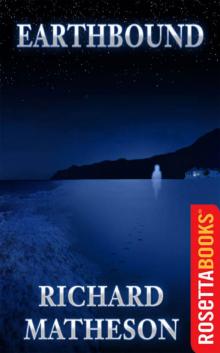 Earthbound
Earthbound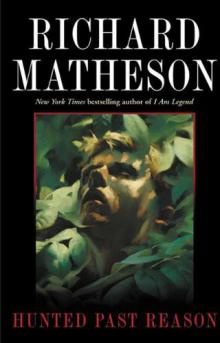 Hunted Past Reason
Hunted Past Reason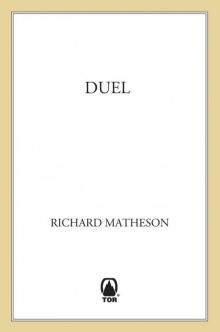 Duel: Terror Stories
Duel: Terror Stories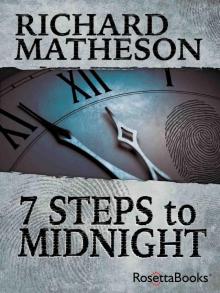 7 Steps to Midnight
7 Steps to Midnight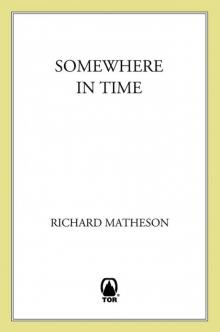 Somewhere in Time
Somewhere in Time Ride the Nightmare
Ride the Nightmare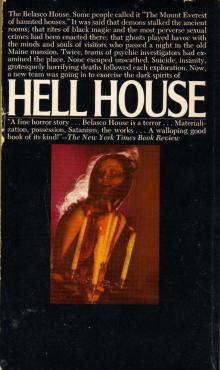 Hell House
Hell House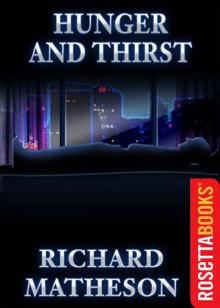 Hunger and Thirst
Hunger and Thirst Lyrics
Lyrics Other Kingdoms
Other Kingdoms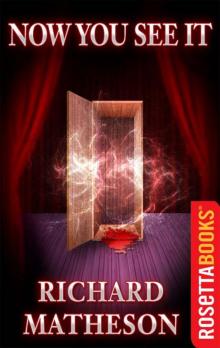 Now You See It . . .
Now You See It . . .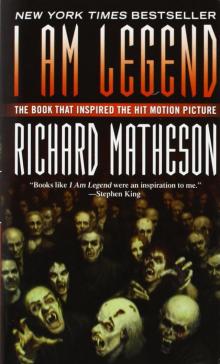 I Am Legend
I Am Legend The Box: Uncanny Stories
The Box: Uncanny Stories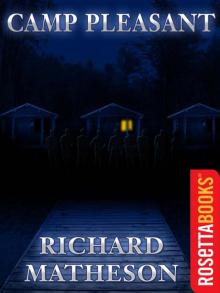 Camp Pleasant
Camp Pleasant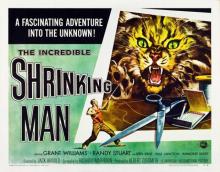 The Incredible Shrinking Man
The Incredible Shrinking Man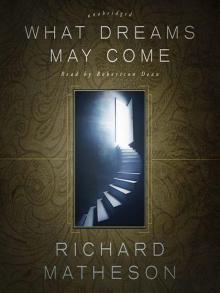 What Dreams May Come
What Dreams May Come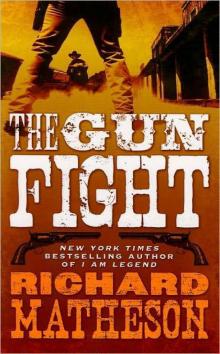 The Gun Fight
The Gun Fight Someone Is Bleeding
Someone Is Bleeding Mediums Rare
Mediums Rare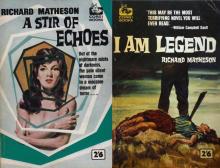 A Stir of Echoes
A Stir of Echoes Backteria and Other Improbable Tales
Backteria and Other Improbable Tales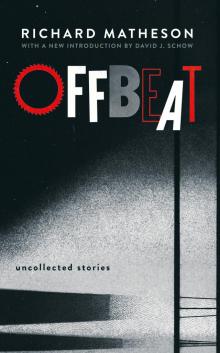 Offbeat: Uncollected Stories
Offbeat: Uncollected Stories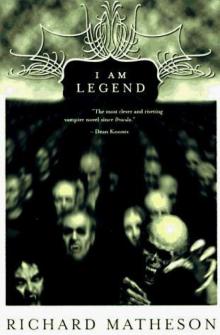 I Am Legend and Other Stories
I Am Legend and Other Stories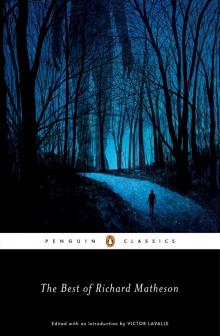 The Best of Richard Matheson
The Best of Richard Matheson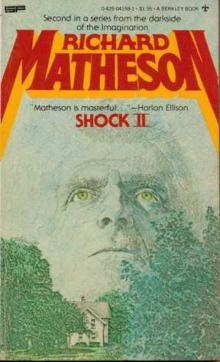 Shock II
Shock II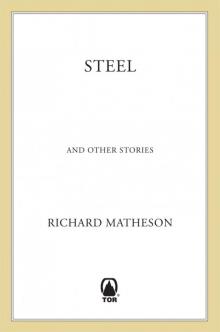 Steel: And Other Stories
Steel: And Other Stories Richard Matheson Suspense Novels
Richard Matheson Suspense Novels The Link
The Link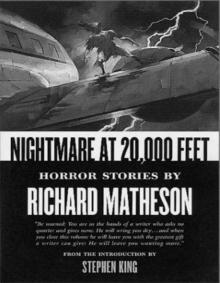 Nightmare At 20,000 Feet
Nightmare At 20,000 Feet Shadow on the Sun
Shadow on the Sun![Steel and other stories [SSC] Read online](http://i1.bookreadfree.com/i/03/21/steel_and_other_stories_ssc_preview.jpg) Steel and other stories [SSC]
Steel and other stories [SSC] Created By
Created By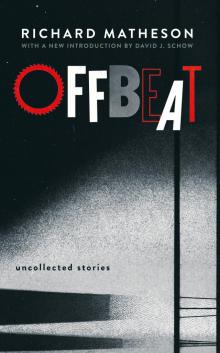 Offbeat
Offbeat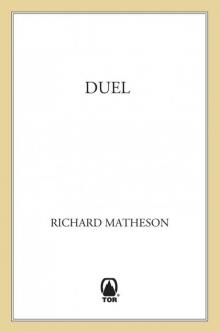 Duel
Duel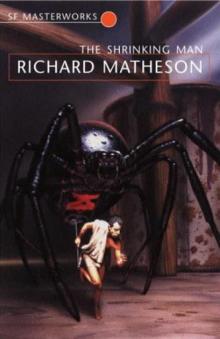 The Shrinking Man
The Shrinking Man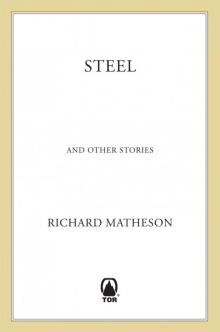 Steel
Steel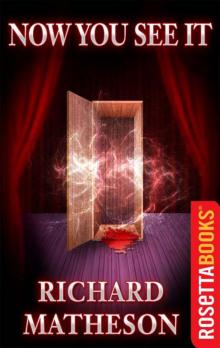 Now You See It
Now You See It